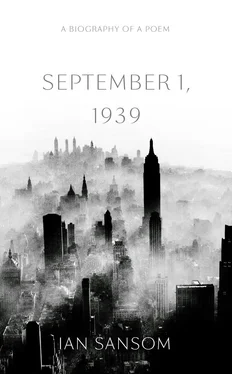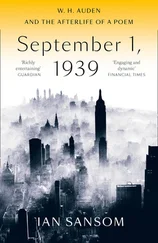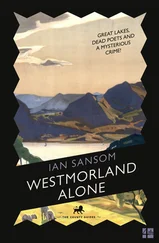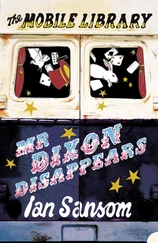Accurate scholarship can
Unearth the whole offence
From Luther until now
That has driven a culture mad,
Find what occurred at Linz,
What huge imago made
A psychopathic god:
I and the public know
What all schoolchildren learn,
Those to whom evil is done
Do evil in return.
Exiled Thucydides knew
All that a speech can say
About Democracy,
And what dictators do,
The elderly rubbish they talk
To an apathetic grave;
Analysed all in his book,
The enlightenment driven away,
The habit-forming pain,
Mismanagement and grief:
We must suffer them all again.
Into this neutral air
Where blind skyscrapers use
Their full height to proclaim
The strength of Collective Man,
Each language pours its vain
Competitive excuse:
But who can live for long
In an euphoric dream;
Out of the mirror they stare,
Imperialism’s face
And the international wrong.
Faces along the bar
Cling to their average day:
The lights must never go out,
The music must always play,
All the conventions conspire
To make this fort assume
The furniture of home;
Lest we should see where we are,
Lost in a haunted wood,
Children afraid of the night
Who have never been happy or good.
The windiest militant trash
Important Persons shout
Is not so crude as our wish:
What mad Nijinsky wrote
About Diaghilev
Is true of the normal heart;
For the error bred in the bone
Of each woman and each man
Craves what it cannot have,
Not universal love
But to be loved alone.
From the conservative dark
Into the ethical life
The dense commuters come,
Repeating their morning vow,
‘I will be true to the wife,
I’ll concentrate more on my work’,
And helpless governors wake
To resume their compulsory game:
Who can release them now,
Who can reach the deaf,
Who can speak for the dumb?
All I have is a voice
To undo the folded lie,
The romantic lie in the brain
Of the sensual man-in-the-street
And the lie of Authority
Whose buildings grope the sky:
There is no such thing as the State
And no one exists alone;
Hunger allows no choice
To the citizen or the police;
We must love one another or die.
Defenceless under the night
Our world in stupor lies;
Yet, dotted everywhere,
Ironic points of light
Flash out wherever the Just
Exchange their messages:
May I, composed like them
Of Eros and of dust,
Beleaguered by the same
Negation and despair,
Show an affirming flame.
Your Least Favourite Auden Poem?
INTERVIEWER: What’s your least favourite Auden poem?
AUDEN: ‘September 1, 1939.’
Michael Newman, interview with W. H. Auden, The Paris Review (1972)
Me too.
*
I have been trying to write a book about W. H. Auden for twenty-five years.
It could not be described as a cost-effective enterprise.
It may not have been the best use of my time.
The poet cannot understand the function of money in modern society because for him there is no relation between subjective value and market value; he may be paid ten pounds for a poem which he believes is very good and took him months to write, and a hundred pounds for a piece of journalism which costs him but a day’s work.
(Auden, ‘The Poet & The City’)
A lot can happen to someone in twenty-five years – though it hasn’t really happened to me. I have overcome no addictions. I have suffered no serious mental or physical breakdowns. There were no major achievements, no terrible lows: I am, in all regards, average to the point of being dull. There is, alas, no backstory to this story. This is not one of those books.
It is not a book about grief.
It is not a book about loss.
It is not a book about some great self-realisation.
I did not go – I have not been – on any kind of a journey with W. H. Auden.
I do not believe that Auden provides readers with the key to understanding life, the universe and everything. Reading Auden has not made me happier, healthier, or a better or more interesting person.
Perhaps the only strange or remarkable thing to have happened to me over the past twenty-five years is that I have been trying to write a book about W. H. Auden.
The only possible conclusion, I suppose, after all this time, is either that I haven’t been trying hard enough, or that I’m simply not up to the job.
Or, possibly, both.
*
Completed finally in my early fifties, in vain and solitary celebration, this – whatever this is – turns out to be proof against itself.
For decades I had imagined writing a big book about Auden’s life and work, a truly great book, a magnum opus .
I have managed instead to write a short book about just one of his poems. At the very moment of its completion, the work turns out to be evidence of failure. Opus minus .
In the end, one feels only depletion, disgust and disappointment, the sense that one has once again turned manna into gall, the everlasting taste of bitterness.
*
(I am reading the collected poems of Bertolt Brecht, in translation. I come across this, ‘Motto’:
This, then, is all. It’s not enough, I know.
At least I’m still alive, as you may see.
I’m like the man who took a brick to show
How beautiful his house used once to be.
This book is my brick: it is proof of how beautiful the house might have been.)
*
Auden wrote all of his prose, he claimed, because he needed the money.
I have written all of my prose because I am not a poet.
And I needed the money.
Underneath the abject willow,
Lover, sulk no more;
Act from thought should quickly follow:
What is thinking for?
Your unique and moping station
Proves you cold;
Stand up and fold
Your map of desolation.
(Auden, ‘Underneath the abject willow’)
Twenty-five years, though – can you imagine? – twenty-five years of failing to write a book.
*
It’s perhaps not entirely uncommon.
There are, of course, individuals who write great books at great speed, and with great success, and to great acclaim – Auden’s first book with Faber was published when he was just twenty-three and he went on to produce a book about every three years for the rest of his life. The truth is, it takes most of us years to get a book published, and even then those books end in massive failure: neglected, overlooked and forgotten.
(My own books, it should probably be admitted, have all ended in massive failure: neglected, overlooked and forgotten. It’s nature’s way. There’s a critic, Franco Moretti, notorious in literary studies, who has pioneered the study of literature as a kind of data set, and he has an essay, ‘The Slaughterhouse of Literature’, which is all about clues in detective literature, and which is an excellent essay, though I’m less interested in his thoughts about clues in detective literature than I am in his redolent title phrase – which he stole from Hegel, actually – because it acknowledges what is rarely acknowledged, which is the hard, painful truth that to study literature, never mind to participate in it, is to become a witness to the sheer horrors of literary history, as savage and violent as all history. ‘The majority of books disappear forever –’ writes Moretti, ‘and “majority” actually misses the point: if we set today’s canon of nineteenth-century British novels at two hundred titles (which is a very high figure), they would still be only about 0.5 percent of all published novels. And the other 99.5 percent?’ I am one of the 99.5 per cent: I am one of the living dead, the Great Unread. This book too will undoubtedly end up in the slaughterhouse, as it should and as it must.)
Читать дальше












